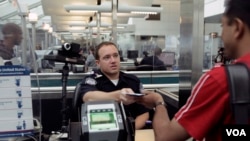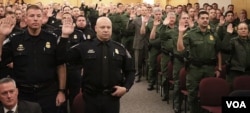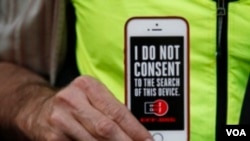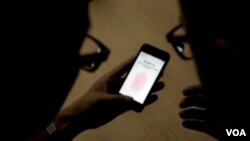Privacy groups are pushing back on U.S. officials who ask visitors for their social media accounts and passwords at entry borders.
“If they come in, we want to say, for instance, 'Which websites do you visit?' and, 'Give us your passwords,'" said John Kelly, head of the U.S. Department of Homeland Security. "We want to get on their social media, with passwords. What do you do? What do you say? If they don’t want to cooperate, then they don’t come in.”
The groups say the requests are illegal and violate the privacy of travelers.
President Barack Obama started the U.S. policy to allow border agents to search electronic devices, and the number of searches greatly increased in 2016, his last year of office. Searches increased to nearly 24,000 in 2016 from nearly 5,000 in 2015, according to the U.S. Customs and Border Protection (CBP), which is overseen by the Department of Homeland Security.
A senior Customs and Border Protection official told the Associated Press that the Trump administration has not changed the Obama policy. The official said that despite the increase, the number of searches is less than one-hundredth of 1 percent of all international arrivals to the U.S.
Emma Llanso says she was shocked by the proposal. Llanso is director of the Free Expression Project at the not-for-profit Center for Democracy and Technology.
“The idea of conditioning travel to the U.S. on actually providing -- not just information about your social media use -- but actually your passwords and the ability for customs agents to review years worth of private emails or other communications that have nothing to do with your admissibility into the country, was just a really concerning precedent,” Llansa said.
Esha Bhandari is an attorney with the American Civil Liberties Union (ACLU). She says the ACLU is asking why foreign visitors, and some American citizens, are being asked for private information.
“The big concern here is more and more numbers of Americans and foreign visitors to the U.S. travel with smart devices that contain almost their entire lives on those devices -- financial information, health information and sensitive personal communications,” Bhandari said.
Some foreign visitors frequently travel to the U.S. for business or tourism and are allowed to stay up to 90 days under the Visa Waiver Program. They are asked to list social media accounts but not passwords with their entry applications.
U.S. officials recently announced plans to add long-term Chinese visa holders to the list who are asked to voluntarily provide social media account information.
Although providing this information is not mandatory -– either at the border or on an application beforehand -– Llanso said it pressures people to comply.
“You're being asked these questions and you think, 'I had better fill out this form as completely as possible, because I don't want to give customs officials any excuse or reason to reject my application.'"
The ACLU’s Bhandari says she fears that changes in U.S. policy will encourage other nations to collect personal data from visitors.
“If sharing social media information becomes a norm for international travel, obviously that's going to affect what people feel free to say online," Bhandari said. "The Internet has really developed as a forum where people are free to speak out. It's an amazing forum, and a very democratizing forum, and this trend risks turning it into a largely monitored space.”
Senator Ron Wyden, a Democrat from Oregon, has questioned the legality of government searches of devices and social media. He recently wrote a letter to Kelly expressing opposition to any future policies for visitors to provide social media passwords.
Wyden is proposing legislation requiring border agents to get a warrant to search personal devices at the border. A warrant is permission from a judge to allow a search. It would also bar law enforcement from seeking social media account information and passwords.
This story first appeared in VOA Learning English.
What have you experienced at border control? Please leave a comment here, and visit us on Facebook, Twitter, Instagram and LinkedIn, thanks!
“If they come in, we want to say, for instance, 'Which websites do you visit?' and, 'Give us your passwords,'" said John Kelly, head of the U.S. Department of Homeland Security. "We want to get on their social media, with passwords. What do you do? What do you say? If they don’t want to cooperate, then they don’t come in.”
The groups say the requests are illegal and violate the privacy of travelers.
President Barack Obama started the U.S. policy to allow border agents to search electronic devices, and the number of searches greatly increased in 2016, his last year of office. Searches increased to nearly 24,000 in 2016 from nearly 5,000 in 2015, according to the U.S. Customs and Border Protection (CBP), which is overseen by the Department of Homeland Security.
A senior Customs and Border Protection official told the Associated Press that the Trump administration has not changed the Obama policy. The official said that despite the increase, the number of searches is less than one-hundredth of 1 percent of all international arrivals to the U.S.
Emma Llanso says she was shocked by the proposal. Llanso is director of the Free Expression Project at the not-for-profit Center for Democracy and Technology.
“The idea of conditioning travel to the U.S. on actually providing -- not just information about your social media use -- but actually your passwords and the ability for customs agents to review years worth of private emails or other communications that have nothing to do with your admissibility into the country, was just a really concerning precedent,” Llansa said.
Esha Bhandari is an attorney with the American Civil Liberties Union (ACLU). She says the ACLU is asking why foreign visitors, and some American citizens, are being asked for private information.
“The big concern here is more and more numbers of Americans and foreign visitors to the U.S. travel with smart devices that contain almost their entire lives on those devices -- financial information, health information and sensitive personal communications,” Bhandari said.
Some foreign visitors frequently travel to the U.S. for business or tourism and are allowed to stay up to 90 days under the Visa Waiver Program. They are asked to list social media accounts but not passwords with their entry applications.
U.S. officials recently announced plans to add long-term Chinese visa holders to the list who are asked to voluntarily provide social media account information.
Although providing this information is not mandatory -– either at the border or on an application beforehand -– Llanso said it pressures people to comply.
“You're being asked these questions and you think, 'I had better fill out this form as completely as possible, because I don't want to give customs officials any excuse or reason to reject my application.'"
The ACLU’s Bhandari says she fears that changes in U.S. policy will encourage other nations to collect personal data from visitors.
“If sharing social media information becomes a norm for international travel, obviously that's going to affect what people feel free to say online," Bhandari said. "The Internet has really developed as a forum where people are free to speak out. It's an amazing forum, and a very democratizing forum, and this trend risks turning it into a largely monitored space.”
Senator Ron Wyden, a Democrat from Oregon, has questioned the legality of government searches of devices and social media. He recently wrote a letter to Kelly expressing opposition to any future policies for visitors to provide social media passwords.
Wyden is proposing legislation requiring border agents to get a warrant to search personal devices at the border. A warrant is permission from a judge to allow a search. It would also bar law enforcement from seeking social media account information and passwords.
This story first appeared in VOA Learning English.
What have you experienced at border control? Please leave a comment here, and visit us on Facebook, Twitter, Instagram and LinkedIn, thanks!







